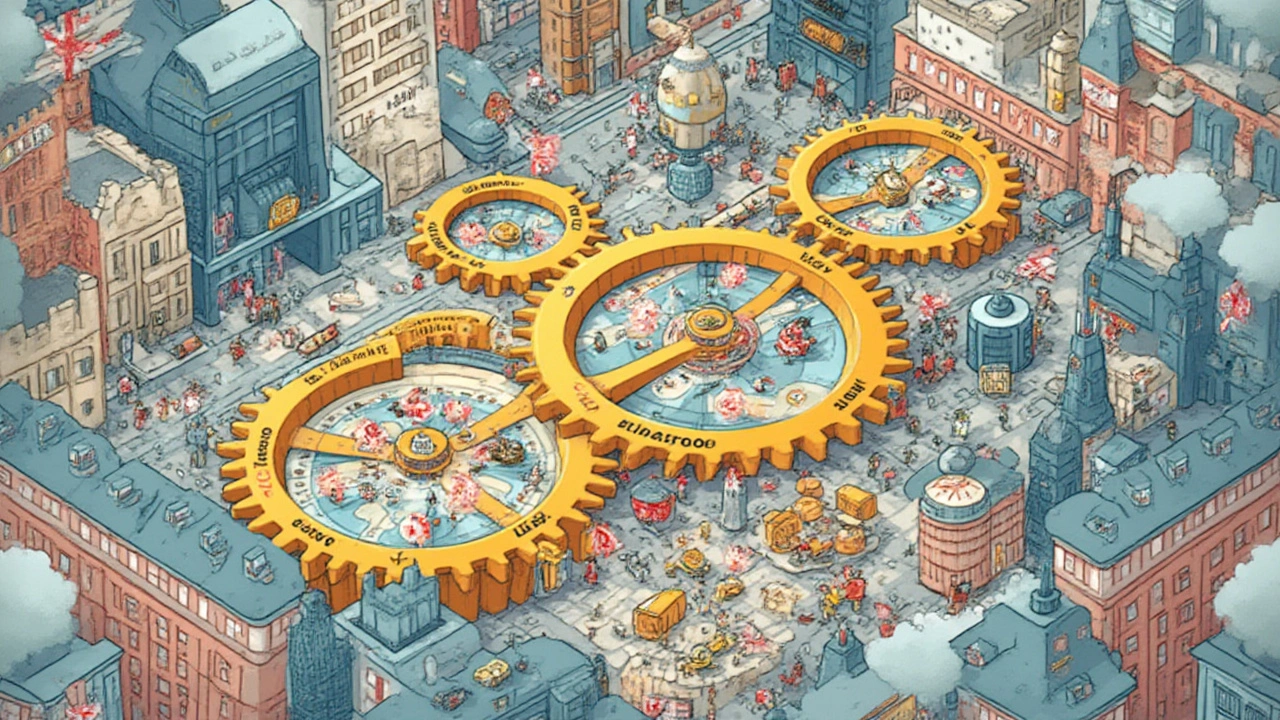Functionalism Explained: How Society Works Together Like a Well-Oiled Machine
 Jul, 7 2025
Jul, 7 2025
Think about any community you’ve lived in—maybe a close-knit small town, a bustling city, or even your favorite online group. Ever notice how things seem to fall into place, rules just kind of appear, and everybody has a part to play? That odd sense of balance is not just random. It’s at the heart of something called functionalism, a way of seeing the world that explains why societies don’t just dissolve into chaos but keep chugging along instead.
What Is Functionalism and Where Did It Come From?
So, functionalism. It sounds scientific, right? But at its core, it asks a simple question—how do the different parts of society fit together and keep things stable? The term first popped up in the late 19th and early 20th centuries, mainly thanks to thinkers like Émile Durkheim. He was this French sociologist who loved studying the daily lives of regular folks. His main idea? Societies sort themselves out so that everything runs smoothly, just like organs in your body doing their separate jobs but keeping you alive and kicking.
If you’ve ever wondered why schools exist or why we have laws, functionalists would say: each serves a purpose. Schools? They teach kids not just math and history but also the unwritten rules, like how to line up or argue politely. Laws? They keep order and stop things from getting messy. Everything gets a place on the giant puzzle that is society.
Much of functionalism’s shine also comes from Talcott Parsons, an American who wanted to figure out how everything connects (and sometimes goes wrong). Parsons believed society does best when all its parts work in harmony—like in a jazz band where everyone knows their rhythm. When something breaks down, dysfunctions appear, and society needs to adapt.
To see how relevant these ideas still are, look at history. After World War II, as countries rebuilt, sociologists used functionalism to understand why some societies bounced back while others floundered. The keyword they used—social structure—became a household term. Think of it like invisible scaffolding that keeps buildings—and societies—standing upright.
The Building Blocks: Social Structure and Social Order
Alright, let’s dig into how all this actually works. Imagine a city block. There’s a school, a police station, shops, apartments, a park, maybe a community center. Each place does something for the people living there. Schools teach, parks provide fresh air and a space for kids to play, and police stations are there to keep you safe. These are all social institutions—big, organized groups that do important jobs.
Functionalists say these institutions form our society’s structure, just like skeletons hold up our bodies. No structure? Things collapse. But that’s not all. Family, religion, and even pop culture play huge parts too. For example, families are where we learn basic skills, but also values—like sharing, respect, and the idea that yes, you have to brush your teeth before bed.
Want an example backed by numbers? According to a 2023 Pew Research Center study, families who sit down for dinner together just three times a week report 25% higher satisfaction with their social ties. Functionalists would say—see, family ritual creates stability and helps society stay glued together.
So why does anyone care about social order? Without it, there’s conflict, confusion about how to behave, maybe even lawlessness. Think about the early days of the pandemic, when normal routines vanished: schools shut their doors, work shifted home, and rules flipped overnight. That shaky feeling was the social structure glitching. Functionalists look at moments like these to figure out how people pull together to restore balance—or carve out new ways of living when the old rules don’t work.

How Functionalism Explains Everyday Life
Most of us don’t wake up and think, “How does my breakfast routine fit into society?” But functionalism finds meaning even in small habits. Take breakfast itself. From a functionalist view, this daily ritual isn’t just about fueling up. It’s time for families to sync schedules, share news, reinforce their unique culture (pancakes or porridge?), and keep the daily rhythm steady.
Jobs follow the same logic. Every profession, whether it’s teaching, bartending, coding, or delivery, has a place in the ecosystem of society. Each job fills a need—teachers pass on knowledge and values, coders build tools, delivery drivers connect creators with customers. Remove any link, and the system starts to wobble. Functionalists love mapping this web, figuring out what happens when certain roles disappear—like breadwinners in an economic downturn or healthcare workers in a pandemic spike.
Don’t ignore clubs, sports teams, and religious groups. These non-work groups create something called “social capital”—the trust, contacts, and shared actions that help neighborhoods thrive. Functionalists spot these patterns and ask, what breaks down when fewer people join, or when rituals are skipped? A 2024 European study found that towns with more local events had 35% fewer reports of loneliness and minor crime, because people recognized each other and weren’t afraid to step in if trouble started.
If you’re curious about what makes cities tick or why drama erupts in even the chillest online groups, functionalism’s answers are pretty practical. When the system works, most people go about their day unnoticed. When one piece falters, like transit failing on a snowy day, the rest of the system scrambles to catch up.
| Social Institution | Main Function | Interesting Fact |
|---|---|---|
| Family | Socialization, support | Eating together boosts kids’ vocabularies faster than story reading |
| School | Education, social rules | First public schools in US date to 1635 (Boston Latin School) |
| Religion | Shared values, moral guidance | Over 80% of the world’s population is religiously affiliated |
| Government | Maintains order, laws | Oldest known written code is Hammurabi’s Code (1754 BC) |
| Economy | Resource distribution, jobs | Global labor force: about 3.5 billion (2024) |
Why Critics Challenge Functionalism and Why It’s Still Useful
Not everyone buys the idea that societies always seek harmony. Some critics, like those in the conflict theory camp (think Karl Marx), insist that tension and inequality are normal, not rare glitches. They point to stubborn problems: school funding gaps, wage inequality, discrimination. They argue that functionalism sometimes glosses over these cracks, making everything seem too neat and tidy.
But here’s the twist—functionalism doesn’t totally ignore problems. Instead, it looks at why some dysfunctions stick around. For instance, why would poverty persist in a wealthy country? Functionalists might say poverty creates jobs for some (think case workers, social agencies, discount stores) or acts as a cautionary tale for others. That sounds cold, but it’s an attempt to see the mechanism, not just blame the system.
Functionalism’s power is explaining why people follow patterns that don’t always help in the short term, like voting when it seems pointless or staying in tough jobs. It tries to map out the causes and explain why certain customs are so stubborn, even when technology or laws change. There’s something pretty reassuring about this way of understanding society—it suggests you can recognize patterns and maybe even predict how societies will change or hold firm in the future.
And it’s increasingly getting mixed with other perspectives to give more complete answers. Modern sociologists talk about “neo-functionalism,” which tries to include questions about power and change, not just harmony.

Applying Functionalism: Tips and Takeaways for Everyday Life
Imagine being able to spot the hidden patterns behind your daily grind or your community’s quirks—it’s a superpower functionalism can help anyone unlock. So next time there’s a heated discussion at work, try to ask yourself: What function does this argument serve? Maybe it’s actually a way for the team to hash out roles or set unwritten boundaries.
If you feel annoyed by rules that seem pointless, like putting your phone away during meetings, look closer. Functionalism argues these rules usually serve a purpose, even if it’s just nudging everyone toward focus. Try seeing if there’s value in traditions you find silly—maybe office birthdays aren’t just an excuse for cake, but a ritual glue holding the team together.
Understanding these hidden structures also helps you adapt. When routines break down—because of a new job, a move, or a big life event—try mapping out what “functions” are missing. Then, see if you can fill them. Lost your after-work sports league? Maybe start a weekly virtual hangout. Found yourself with extra free time after a schedule change? Use it to pick up a new skill or check in with old friends, replacing the social capital your old routine provided.
For parents, educators, or anyone working with groups, keeping a functionalist mindset means watching for what breaks and gets rebuilt, not just assigning blame. Change is part of the process—society loves to re-balance. Trust that pattern-spotting can help you navigate weird transitions, whether it’s a tech upgrade or a cultural shift in your neighborhood.
If you get hooked on finding how all society’s gears fit together, try keeping a journal of everyday functions you notice—both the obvious (traffic lights control chaos) and the subtle (shared memes create in-jokes). You’ll start to see just how interconnected life really is, and where the system could use a little oil.